BU Initiative on Cities: US Mayors Pessimistic about Post COVID Budget Cuts, Long-term Damage

The survey found that 45 percent of the mayors expected to make or see “dramatic” cuts to school budgets, and more than 40 percent thought public schools would not return to normal until after 2021. Photo by ferrantraite/iStock
BU Initiative on Cities: US Mayors Pessimistic about Post COVID Budget Cuts, Long-term Damage
Survey, out today, reveals partisan divide on aid to cities
As the COVID-19 pandemic swept across the country last spring and summer, the mayors of American cities feared devastating cuts to school budgets and worried that the impact on minority residents and renters would be crippling. They wondered how long it would take for education, transportation, and arts and culture to return to the old normal. And many reached out to other mayors for advice and moral support.
Those and other responses to the pandemic are revealed in a report released today by Boston University’s Initiative on Cities (IoC). The IoC team surveyed 130 mayors of cities with a population greater than 75,000 between June and August, asking them about the likely consequences of the COVID-19 pandemic. The IoC, which has surveyed American mayors about a host of urban problems annually for the past six years, received support for the survey from Citi Community Development and the Rockefeller Foundation.
The 2020 Menino Survey of Mayors concluded that US mayors considered 2020 to be a moment of reckoning. The survey also found that they were deeply concerned about the lasting impact COVID-19 will have on schools, small businesses, and renters. The mayors were convinced that while COVID-19 has cast light on health disparities through its disproportionate impacts on Black and brown communities, that attention will not lead to necessary changes. A report on the survey, written by David Glick and Katherine Levine Einstein, both College of Arts & Sciences associate professors of political science, Maxwell Palmer, a CAS assistant professor of political science, and Stacy Fox, IoC associate director, noted with discouragement that the federal response to COVID-19 has included very little in the form of direct investments in cities and has prioritized only cities with more than 500,000 residents. Those cities represent less than 0.5 percent of all municipalities and only 14 percent of the country’s total population.
“In the seven years of conducting the Menino Survey of Mayors, one of the most consistent findings has been a general sense of optimism among our cities’ leaders,” says IoC director Graham Wilson, a CAS professor of political science. “This year, while we still hear glimmers of optimism, their pessimism in the face of a once-in-a-century pandemic is palpable. And with the pandemic still spreading and the federal government still unable to come to an agreement on additional stimulus, we suspect mayors may actually be underestimating just how much their cities will change.”
The report predicts that cities will need more help to address the many looming concerns, and that future presidential administrations will have to deal with the repercussions of this pandemic. The IoC authors urge those administrations to consult local leaders, and to pay attention to the looming potential crises facing our education system and small businesses. Future leaders, they say, would do well to consider the ways that the shift to remote work and possible retreat from mass transit will transform downtown urban centers.
The survey found, for instance, that 80 percent of mayors expected racial health disparities to widen in the future, that they did not expect the attention that COVID-19 is bringing to the issues will lead to progress. Glick says he was actually encouraged by that finding. “It sounds strange,” he says, “but it’s encouraging in that it’s consistent with mayors seeing deep structural problems, not things that can be easily fixed with some salience and attention. Given that we tend to see mayors erring on the side of what we as outsiders see as the optimistic side in these surveys, pessimistic responses like their views on racial health disparities stand out. They are both depressing and in some ways encouraging at the same time. Another thing that I think about in the same way was their general support for eviction moratoriums that often came with comments suggesting some of them saw deeper housing and economic challenges that eviction moratoriums couldn’t fix and that they were aware that the bill for such challenges was coming due to government and society.”
The survey also revealed some deep partisan divides. Residential eviction moratoriums, for example, were supported by 93 percent of Democrats, but only half of Republicans, and universal paid sick leave found near universal support among Democratic mayors, and significantly less support from Republicans.
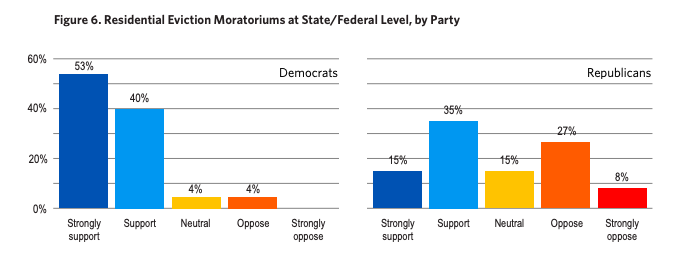
Only 13 percent of mayors thought there was enough CARES Act money for small businesses in their cities, and 46 percent believed that there was a “large gap” between what was available and what was needed. Many mayors said they support potential state and federal policies that could strengthen the social safety net.
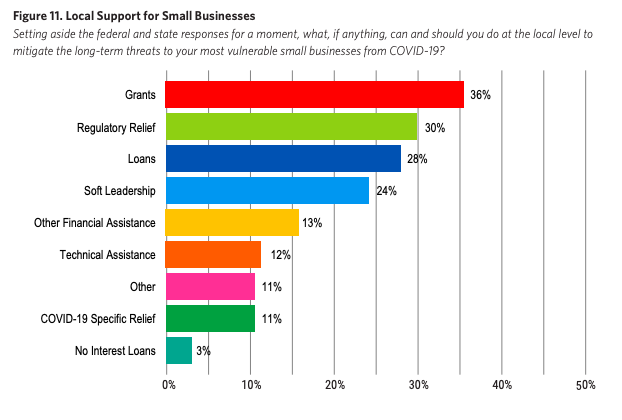
About two-thirds of mayors feared that nonwhite small business owners would feel significant economic harm into next summer, while half believed the same to be the case for white small business owners. In response to an open-ended question about ways to protect vulnerable small businesses, mayors most often discussed the creation of new grants (36 percent) and loans (28 percent), along with regulatory relief (30 percent). Nearly all mayors (92 percent) created additional outdoor dining space to enable restaurants to continue to operate safely.
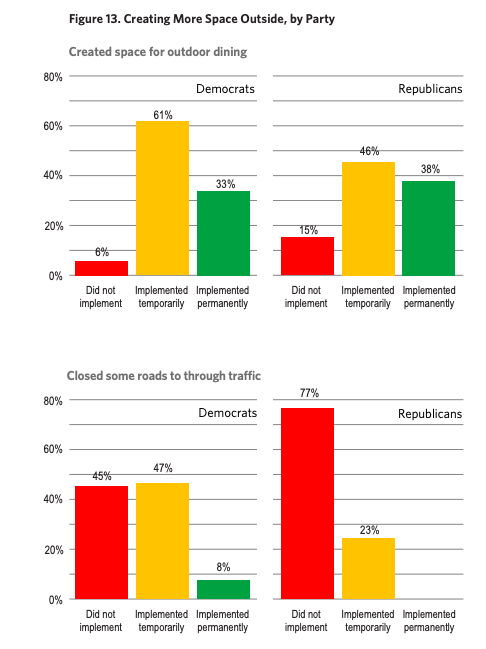
Two-thirds of mayors believed that Latinos, renters, immigrants, and Black residents would still be feeling at least a lot of economic harm next summer. Half of the mayors surveyed thought it would not be until after next year (2021) that arts and culture “return to normal.”
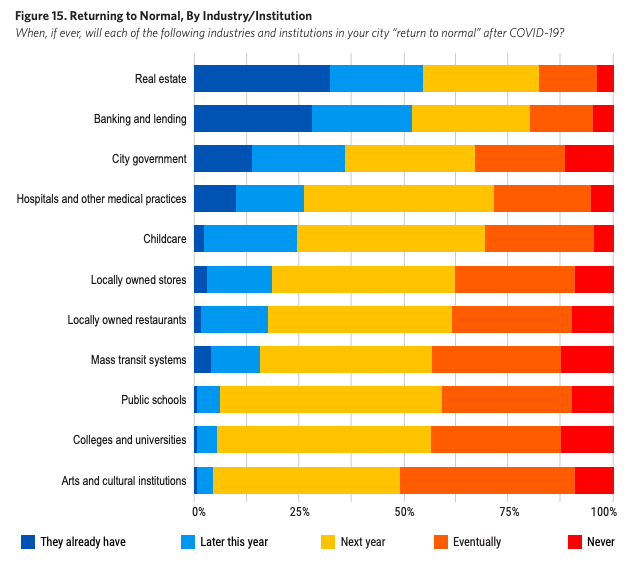
More than 40 percent of mayors expected similar recovery times for public schools, colleges, and universities, as well as mass transit. In contrast, most mayors said that real estate and banking and lending have either already returned to normal or would do so by the end of this year.
About 45 percent of the mayors said they expected to make or see “dramatic” cuts to school budgets, a finding that alarmed coauthor Einstein. “My status as a parent of young children may bias me,” says Einstein, “but one aspect that really stood out to me was mayors’ pessimism about schools. They largely expect a return to normal for our schools to be far away. Their concerns suggest that we should all be very, very concerned about the long-term, downstream effects of these school closures, especially on our most vulnerable children.”
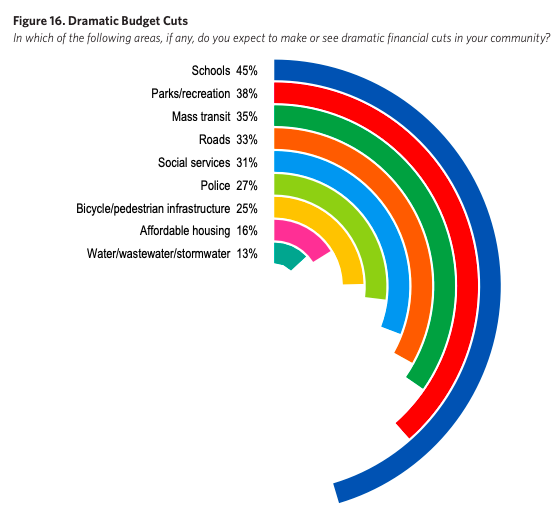
Asked about how the development of a vaccine would change things, 90 percent thought residents would still work from home more than they did before COVID-19, three in four said the same about visiting parks, and two in three said it about walking. On the other hand, more than half expected long-term negative effects on how often their residents would go to public events like concerts and shop at stores relative to pre-COVID-19 levels. Downtown office buildings would become “less desirable,” 60 percent agreed.
About 36 percent expected that small businesses that close as a result of the COVID-19–impaired economy will be quickly replaced by new ones—signaling the possibility of a dramatic upheaval to the local small business landscape. On the other hand, more than 70 percent of mayors believed that cities will offer more opportunities to more people in the future. In contrast to their views on racial health disparities, a majority disagreed that the racial wealth gap will widen.
The survey, one of four conducted this year by the IoC, used a combination of open-ended and closed-ended questions to explore salient local issues and policy priorities. The three other surveys conducted in 2020 asked mayors about policing and protests, parks and greenspace, and the 2020 US Census.
Find related and forthcoming reports on the 2020 Menino Survey findings here.

Comments & Discussion
Boston University moderates comments to facilitate an informed, substantive, civil conversation. Abusive, profane, self-promotional, misleading, incoherent or off-topic comments will be rejected. Moderators are staffed during regular business hours (EST) and can only accept comments written in English. Statistics or facts must include a citation or a link to the citation.